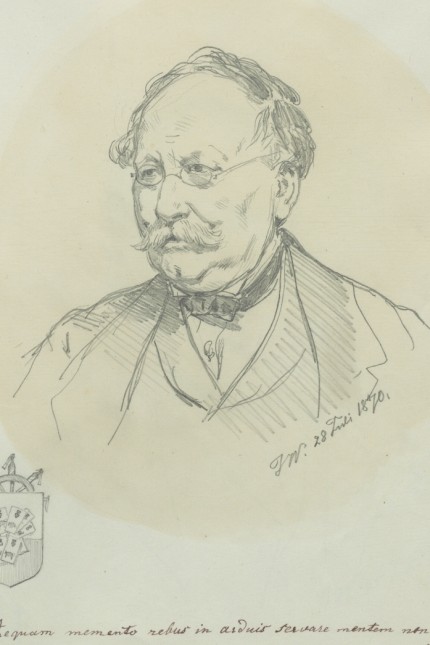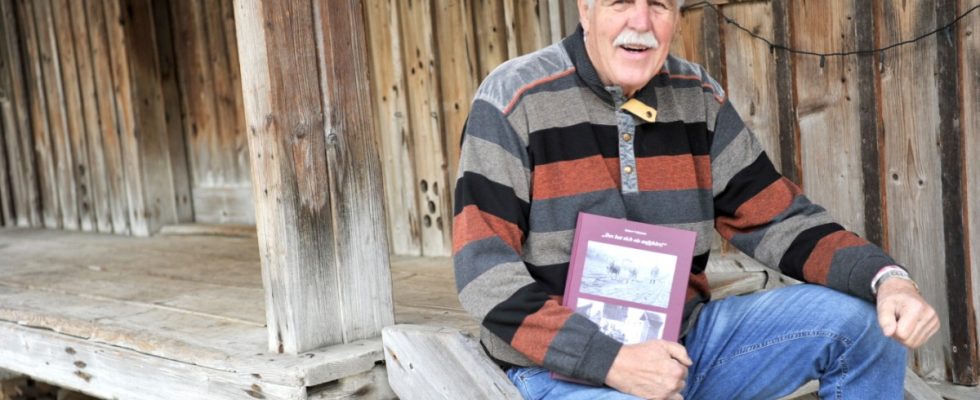He did it again. The local historian Robert Volkmann from Schlagenhofen has published his 20th book. “I just can’t keep my word,” says the former high school teacher, almost apologetically, and then reveals a few key details about his new work: 320 pages, 417 images, 456 quotes and notes – the whole thing weighs almost two kilos. For the book launch of the special edition of the Inninger History Papers, he invited people to the more than 100-year-old warehouse in Schlagenhofen, a district of Inning. It has long since stopped being used by farmers. “It has stopped,” says Volkmann. That is also the title of his book, in which he describes the history of farmers and agriculture in Inning and the surrounding area.
SZ: Mr. Volkmann, you describe yourself as a Schlagenhofen farmer. How come a farm boy writes 20 books?
Robert Volkmann: Oh, that’s meant to be self-ironic because, with the exception of my studies and a short time at school with the Swabians, I have never left my hometown for three quarters of a century. At home I was always surrounded by farms and rural people. The cooperative warehouse still stands opposite. But there are almost no farmers left in the village. When I was a child there were still some critters in the stable. I also knew how to drive a bulldog. Sending me to school was the right decision. I wrote the “Farmer’s Book” because my source told me that I should write it down because if I didn’t do it, no one here would do it.
Who is the book aimed at?
If you want to know what it was like in the village in the past, especially in the Inning area, you can get solid information in the book. And if he still has any connection to agriculture, his past will certainly come back to life for him. You can learn a lot about developments in the area of our food production and also about problems. Maybe some people will then look at our breadwinners a little more positively, I hope.
The title “des hat sich ois aufghört” runs like a common thread through the book. On the one hand there is a bit of melancholy in the statement, but on the other hand you also describe very clearly that farm life was anything but romantic and idyllic.
My 86-year-old farmer, who gave the wonderful title quote, draws this conclusion in his earlier stories. Without blame, but also with melancholy. Another farmer from Inning said to me: “But it was pretty good work.” And that there were many more people on a farm, there was more “beinanda”. But everyone admits that the work demanded a lot physically and that the results of the effort often hardly ensured survival. It’s good that the hard work, the mostly poor conditions, the meager food – yes, that too – is over.
Local historian Robert Volkmann is always interested in rural life around Inning. This picture comes from “Forest and Wood – then and now”, a special issue of the Inninger History Papers.
(Photo: Arlet Ulfers (Repro)/Inninger History Papers)
The book is a mixture of specialist articles, statistics and scientific articles, paired with personal and partly autobiographical statements and many photos of private families. How did you get the material? Where did you research?
I must have been to the State Archives in Munich more than 20 times to write this book; There I looked at a large part of the Seefeld Counts Toerring’s files on the country and its people. Sometimes a very laborious task of deciphering. I looked at almost 100 books on the subject of “Farmers and Agriculture” from the State Library’s holdings – including new publications – and actually read a lot of them. Very important: I studied the so-called “physics reports” from the Starnberg regional court from 1859. It is extremely interesting what the village priests wrote down to the Starnberg district medical examiner Joseph von Linprun to pass on to the government in Munich. Very open, sometimes disturbing things. Organized agriculture’s really well-made information services on the current situation are available free of charge. And of course I used Jutta Göbber’s Inningen community archive and Franz Meier’s gigantic collection of images.

The regional medical examiner Joseph von Linprun passed on the pastors’ reports to the government in Munich.
(Photo: Halmburgia Society)
In addition to the biographies, there are always digressions to put the whole thing into a historical context. Is the former history teacher coming through?
Well, learning is learning. 40 years of higher education, including 35 at the high school in Gilching, are simply reflected. One shouldn’t believe that world history isn’t reflected in the villages. You look at the war memorials, and what united – and divided – the Nazis and farmers must also be addressed, even if some people don’t like it that much. And what happens next with the farmers is really not something that is decided in the villages.
The so-called good old days are completely demystified in the book. Women and children were not treated particularly squeamishly. I quote a saying from her book: “Women’s death: koa corruption. Rossvarrecka: big Schrecka!”
We have actually made huge improvements when it comes to dealing with women and children and their legal situation. It is proven in pastors’ and medical officers’ reports that, given the supply situation, the vast majority of farmers really did not see having many children as a blessing. Allegedly, according to credible reports, many a farming family wished that the newborn, additional eater would “go to heaven”, that is, die; a better existence awaited him there. You have to take a breather.
But not everything is better today. Keyword: nature and environment.
Unfortunately, in the whole system, the farmers are somehow both perpetrators and victims. Modern mechanical land cultivation, fertilization, weed and insect destruction, large-scale cultivation, and the disappearance of field margins have contributed significantly to the almost complete disappearance of skylarks and hares, for example, and no frog survives five mowing of standard meadows.
In most families, meat was only served at holy times
Another chapter is dedicated to food. You really do away with idealized ideas.
True. The hearty farmer’s feast in today’s inns is a serious misinformation. For the vast majority of farmers, meat was only served at holy times. I cite several sources that speak of “sparse food”. Puree, curd noodles, rye noodles, cabbage and turnips, eggs, lard and grain were the basis of rural food. Things usually looked better at church fairs. Some things couldn’t be stored over the winter, and for some animals it was time for slaughter in late autumn because you couldn’t feed them all over the winter.
There are interesting things to learn about many terms such as “mand up” or “be on guard”, which originally come from rural life.
The final chapter is about what is being lost in our vocabulary with the old agriculture. There’s no such thing as an “ox in front of the mountain”, the “single file” through the village has long since ceased to exist and so on.
What is the situation with agriculture in Inning today?
Not that bad. Sarcastic: Agriculture has shrunk to health. The laws of the market, phenomenal technical innovations and state policies have ensured or allowed that of the almost 80 farms in the present municipality that are somehow involved in farm work, not even a dozen remain. But, thank God, it looks like the ones left are actually holding their own. The farms are technically very well equipped and the next generation is excellently trained. But sometimes when I see them on their tractors, I think that they should get off, put their hands in the earth and just let it trickle through their fingers.
The book “It has already stopped!” is sold for 22 euros on Fridays from 8:30 a.m. to 10:30 a.m. in the Archive Inning. It is available at the Inningen library and can be sent by email to [email protected] be ordered.

